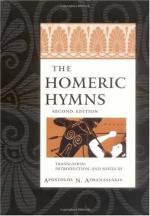So spake he, and called upon his horses, and at his call they swiftly bore the fleet chariot on like long-winged birds. But grief more dread and bitter fell upon her, and wroth thereafter was she with Cronion that hath dark clouds for his dwelling. She held apart from the gathering of the Gods and from tall Olympus, and disfiguring her form for many days she went among the cities and rich fields of men. Now no man knew her that looked on her, nor no deep-bosomed woman, till she came to the dwelling of Celeus, who then was Prince of fragrant Eleusis. There sat she at the wayside in sorrow of heart, by the Maiden Well whence the townsfolk were wont to draw water. In the shade she sat; above her grew a thick olive-tree; and in fashion she was like an ancient crone who knows no more of child-bearing and the gifts of Aphrodite, the lover of garlands. Such she was as are the nurses of the children of doom-pronouncing kings. Such are the housekeepers in their echoing halls.
Now the daughters of Celeus beheld her as they came to fetch the fair-flowing water, to carry thereof in bronze vessels to their father’s home. Four were they, like unto goddesses, all in the bloom of youth, Callidice, and Cleisidice, and winsome Demo, and Callithoe the eldest of them all, nor did they know her, for the Gods are hard to be known by mortals, but they stood near her and spake winged words:
“Who art thou and whence, old woman, of ancient folk, and why wert thou wandering apart from the town, nor dost draw nigh to the houses where are women of thine own age, in the shadowy halls, even such as thou, and younger women, too, who may kindly entreat thee in word and deed?”
So spake they, and the lady Goddess answered:
“Dear children, whoever ye be, of womankind I bid you hail, and I will tell you my story. Seemly it is to answer your questions truly. Deo is my name that my lady mother gave me; but now, look you, from Crete am I come hither over the wide ridges of the sea, by no will of my own, nay, by violence have sea-rovers brought me hither under duress, who thereafter touched with their swift ship at Thoricos where the women and they themselves embarked on land. Then were they busy about supper beside the hawsers of the ship, but my heart heeded not delight of supper; no, stealthily setting forth through the dark land I fled from these overweening masters, that they might not sell me whom they had never bought and gain my price. Thus hither have I come in my wandering, nor know I at all what land is this, nor who they be that dwell therein. But to you may all they that hold mansions in Olympus give husbands and lords, and such children to bear as parents desire; but me do ye maidens pity in your kindness, till I come to the house of woman or of man, that there I may work zealously for them in such tasks as fit a woman of my years. I could carry in mine arms a new-born babe, and nurse it well, and keep the house, and strew my master’s bed within the well-builded chambers, and teach the maids their tasks.”




